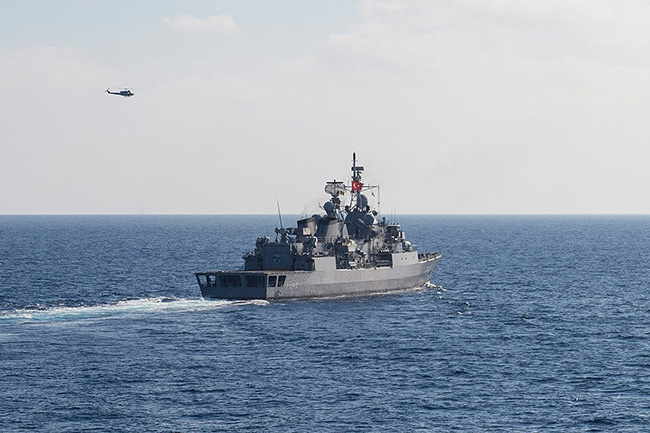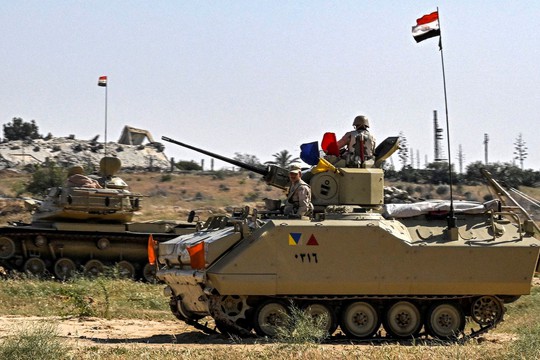An Egyptian M60 battle tank and an infantry fighting vehicle near the Egyptian side of the Rafah border crossing with the Gaza Strip.
Photo: AFP
Israeli Prime Minister Benjamin Netanyahu has asked the Trump administration to press Egypt to scale down a recent military build-up in the Sinai Peninsula, one U.S. official and two Israeli officials tell Axios.
Why it matters: Israeli officials say the Egyptian military build-up in Sinai has become another significant point of tension between the countries as the war in Gaza continues.
Behind the scenes: During their meeting in Jerusalem on Monday, Netanyahu presented Secretary of State Marco Rubio with a list of activities in Sinai that he claimed were substantial violations by Egypt of its 1979 peace agreement with Israel, for which the U.S. serves as guarantor.
Two Israeli officials said the Egyptian have been establishing military infrastructure — some of which could be used for offensive purposes — in areas where only light weapons are allowed under the treaty.
The officials claimed the Egyptians extended runways at air bases in Sinai so that they could be used by fighter jets, and built underground facilities which Israeli intelligence believes could be used for storing missiles.
There's no evidence the Egyptians are actually storing missiles in those facilities, the officials say.
But they claim the Egyptians did not provide a reasonable explanation as to their purpose when asked by Israel through diplomatic and military channels.
What they're saying: One Israeli official said Israel decided to ask the Trump administration to intervene after direct talks with the Egyptians showed no progress.
"What the Egyptians are doing in Sinai is very serious and we are very concerned," a second Israeli official said,
The official said the situation is made worse by the fact that the U.S.-led multinational force of observers has dramatically decreased its overflights in Sinai, therefore limiting its ability to monitor the situation.
An Egyptian official denied the Israeli claims and said the Trump administration hasn't raised the issue with Egypt recently.
The big picture: Tensions between Israel and Egypt have been steadily increasing since the Netanyahu government was formed in late 2022.
Netanyahu and Egyptian President Abdul Fattah al-Sisi haven't had any public meetings for almost three years, and there is no public record of a phone call between them since June 2023.
Friction point: The Egyptians have grown increasingly worried during Israel's war in Gaza that Netanyahu and his government want to push some or all of the two million Palestinians in Gaza into Sinai.
The Egyptians boosted their forces on the border with Gaza and said an influx of Palestinian refugees would be treated as a threat to Egypt's national security. Sisi's government has also warned Israel against actions that could undermine their peace agreement.
Netanyahu, meanwhile, criticized Egypt publicly for its refusal to accept Palestinian refugees from Gaza. He recently accused Egypt of "imprisoning against their will residents in Gaza who want to leave a war zone."
The latest: After the Israeli strike on Qatar earlier this month, Sisi sent a message directly to the Israeli people during a speech in Doha, warning the Netanyahu government was endangering the peace agreement with Egypt and making further normalization with countries in the region impossible.
What to watch: The Egyptians have also alarmed Israeli officials with discussions of a joint Arab military force as a response to the Israeli strike in Doha.
Military response to Israel – Turkey and Egypt launch first joint drills in 13 years
 After 13 years, Turkey and Egypt are set to hold joint naval drills in the Eastern Mediterranean.
After 13 years, Turkey and Egypt are set to hold joint naval drills in the Eastern Mediterranean.
Photo: Wikimedia Commons
Turkey and Egypt will stage joint naval exercises later this month for the first time in 13 years, a milestone in the normalization of relations after a decade of tension. Turkey’s defense authorities said the “Friendship Sea” drills are scheduled for September 22–26 in the eastern Mediterranean, with senior commanders from both navies due to observe on September 25.
According to the announcement, Turkey will deploy frigates, fast-attack craft, a submarine and F-16 fighter jets to train alongside Egyptian naval units, focusing on coordination at sea and in the air. The exercise includes a high-level observation phase intended to showcase command-and-control procedures and interoperability after years without bilateral drills.
On September 15, 2025, the Egyptian and Turkish presidents met on the sidelines of an emergency Arab-Islamic summit in Doha, underscoring converging agendas on regional crises.
The Gaza war has further pushed the two governments into tactical alignment. Both have criticized Israel’s conduct and worked — openly and behind the scenes — around cease-fire and humanitarian arrangements, even when their approaches differ. The Doha summit spotlighted these efforts and provided additional political cover for closer coordination.
Operationally, reviving the “Friendship Sea” format (known as Bahr El-Sadaka/Dostluk Denizi) allows two of the Mediterranean’s largest militaries to rebuild communication protocols and practice at-sea deconfliction in crowded waters where misunderstandings can rapidly escalate.
read more in our Telegram-channel https://t.me/The_International_Affairs

 9:42 23.09.2025 •
9:42 23.09.2025 •























